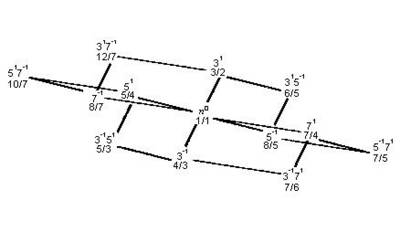
Gratuitous 7-limit Lattice photo.

There have been an abundance of ideas rolling around the new music blogs recently...
Public Exposure Strategies
Kyle Gann muses about the strategies for attracting attention to his music. He has three CDs that ready for release this year he's wondering if having all three out at once will make a bigger, attention-getting noise or if the abundance new material will dilute the impact.
I've been reading Gann for many years. His column motivated me to subscribe to and devour the Village Voice for awhile. He's an excellent writer. His music is less familiar to me and I've been deeply curious about it for well over a decade. I once heard a Gann piece at a Bang On A Can marathon concert that impressed me. He has some of his own work at his Postclassic Radio station which I look forward to hearing each time they come up. Based on the tiny sample of his music that I've had the pleasure of hearing my curiosity is piqued. I sense that there's quite a variety to his output in terms of sonic texture and instrumentation. His disklavier music is fascinating while I find some of his text compositions troubling. (His text music reminds me of "Callin' Home Coyote" by Janice Giteck, a piece that used to get on my nerves for a long time until I figured out how to hear the vocal parts... then it became one of my all time favorite pieces. Text-music in general is difficult for me to appreciate on first exposure).
Speaking as a sympathetic listener, and occasional blogger, I don't see the argument for holding back. If there's one Kyle Gann disc out there I want to hear it. If there's three I want to hear it. And chances are I'll want to talk about and spread the word. I don't know what effect in terms of press and public attention one versus three releases would have. But there comes a point where you have to release this music for the sympathetic listeners who cannot imagine any postclassical composer suffering from "overexposure."
Tackling a New Orchestra Composition
Forrest Covington explores a familiar set of themes regarding composing in isolation. His reflections upon that and his "chord of the month" installments are deeply resonant to my sensibilities. I understand the strategy of writing for composition contests with the lure of getting a performance out of it. And I also understand that "winning" is a tricky game that often requires tailoring one's composition to fit the criteria of the contest (as well as the aesthetic agendas of the judges involved).
I wish Mr. Covington well on his composition project. I'd love to hear it.
How to Listen
Tim Johnson adds his personal take on the subject of listening habits. He specifically addresses the sensual versus the analytical ear. I've actually never found the two to be separable. Somehow my brain is wired so that both ends of that spectrum respond the same way. So I naturally seek out music that is often categorized as "cerebral." I do the same thing with books and movies.
So What The Hell Kind of Music Do You Do Anyway?
Paul Bailey has been doing a number of posts addressing the awkward question of "so what kind of music do you write?" and the lack of accurate names for contemporary music practice. He runs through the usual suspects of "experimental," "postclassical," "postminimalist," "postmodern" and finds them lacking.
Having a good answer ready for that question does make for good PR. But it's nearly impossible to formulate a good one given the lack of common reference points. Bailey resorts to citing Reich and Glass only to find that many are unfamiliar with even those relative "superstars" of contemporary music. I used to be a big fan of calling it "unpopular music" until I decided it would be more constructive to define it by what it is rather than what it is not. I could call my own music "Progressivist" or "Alternate Intonation Based Music." The ultimate problem is that words are poor descriptors of sonic worlds. I am, however, still of the opinion that there's more value to framing things positively. Describe things for what they are. Advocate what you believe.


1 comment:
it took me a while, but my group is now know as "the alternative classical garage band" . it's the only thing i have been able to say to friends and family without scratching their heads.
Post a Comment